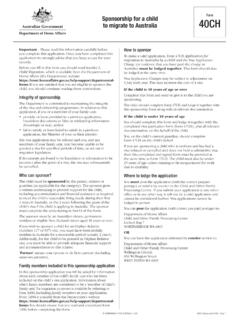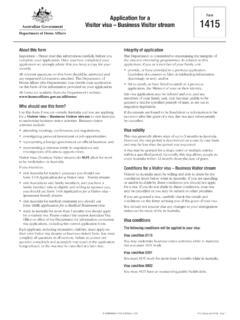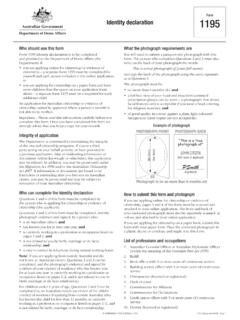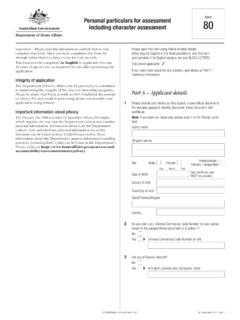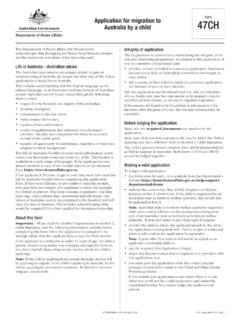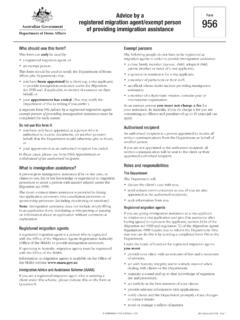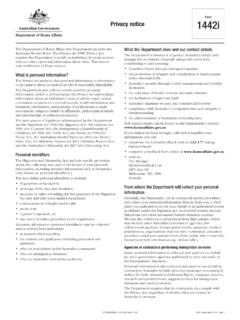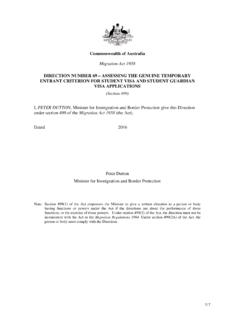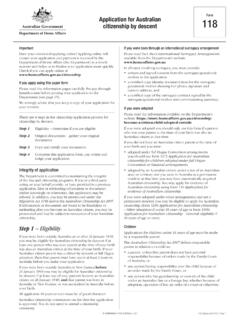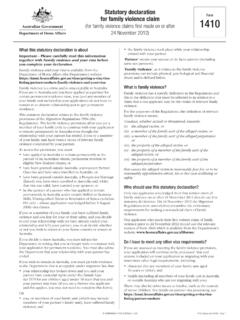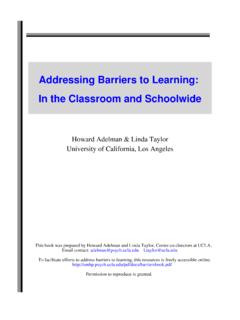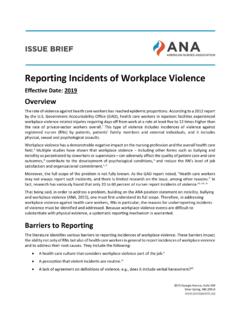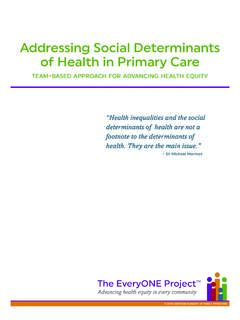Transcription of About the research - Home Affairs
1 Australian Government Department of Immigration and Citizenship About the research Economic, civic and social contributions of refugees and Humanitarian entrants literature review Refugee Council of Australia research on the ways in which Australia s Humanitarian Program contributes to society can inform the development of enabling policies and increase public understanding of and support for the program. While there is continuing research in Australia on Humanitarian Program entrants settlement needs, there was a scarcity of information on the benefits that Humanitarian resettlement brings to Australia. This literature review was the initial stage of a project looking into the economic, social and civic contributions to Australia of first and second generation Humanitarian Program entrants.
2 Subsequent primary research and data analysis aim to confirm, clarify and build on the findings of the literature review. Key messages The literature review found that while there may be short-term costs as refugees are resettled and adjust to their new surroundings, after successful integration they make permanent cultural , social and economic contributions. Humanitarian entrants are often entrepreneurial as they establish themselves in a new environment in the year 2000, five of Australia s eight billionaires were people whose families had originally come to the country as refugees. Their impact has been positive in regional and rural Australia through providing labour and stimulating economic growth and service delivery.
3 Available sources point to above average rates of success in education and employment for children of Humanitarian entrants. Informal volunteering plays an important role in building social capital, and volunteers from ethnic communities provide the greater part of their services to benefit society as a whole rather than their own ethnic group. The literature review identified a relative lack of research differentiating Humanitarian entrants from other migrants and a need for longitudinal data collection and research into their economic progress. It is suggested that priority be given to further study of local conditions that promote or hamper economic integration and participation.
4 Policy Innovation, research and Evaluation Unit December 2010 6 Chan Street Belconnen ACT 2617 PO Box 25 BELCONNEN ACT 2616 Telephone: 02 6264 1111 Fax: 02 6225 6970 ECONOMIC, CIVIC AND SOCIAL CONTRIBUTIONS OF REFUGEES AND HUMANITARIAN ENTRANTS A Literature Review Prepared by the Refugee Council of Australia for the Department of Immigration and Citizenship Released February 2010 Economic, Civic and Social Contributions of Refugees and Humanitarian Entrants A Literature Review page 2 Contents CONTENTS Executive Summary 3 Introduction 6 1. Benefits of Australia s Refugee and Humanitarian Program 7 2. Skill Shortages and Opportunities for Humanitarian Entrants 15 3.
5 Educational and Labour Force Outcomes of the Second Generation 22 4. Overcoming barriers to Economic Progress 28 5. International Comparisons of Labour Force Outcomes 44 6. Voluntary Work among Refugee Communities 52 Annotated Bibliography 57 References 79 Commonwealth of Australia 2010 This work is copyright. Apart from any use as permitted under the Copyright Act 1968, no part may be reproduced by any process without prior written permission from the Commonwealth. Requests and inquiries concerning reproduction and rights should be addressed to the Commonwealth Copyright Administration, Attorney General s Department, Robert Garran Offices, National Circuit, Barton ACT 2600 or posted at Cover photo: Moo Moo, a Karen refugee entrant and farmer originally from Burma, with Adult Multicultural Education Services (AMES) Community Guide Kaw Doh Htoo at a market garden in Werribee, Victoria.
6 Moo Moo was assisted to find work through the AMES Labour Harvest Program (see page 38). Photo reproduced with permission from AMES 2009 Economic, Civic and Social Contributions of Refugees and Humanitarian Entrants A Literature Review page 3 Executive Summary EXECUTIVE SUMMARY This literature review on the economic, social and civic contributions of refugees covers relevant national and international sources while also seeking to identify information gaps and recommend future avenues of research . Key findings The 740,000 refugees and humanitarian migrants settled by Australia since Federation have had a profound impact in enhancing the nation s social, cultural and economic life.
7 Their resettlement has played a crucial role in international efforts to provide protection to persons whose life, liberty, safety and other fundamental rights are at risk. It has also enabled Australia to tangibly demonstrate its international solidarity with the mostly poor countries hosting the majority of the world s refugees. This should remain the primary focus of the resettlement component of Australia s Refugee and Humanitarian Program while at the same time exploring new ways to utilise better the huge potential that refugees have to enrich the nation. Refugees make substantial contributions to their new country expanding consumer markets for local goods, opening new markets, bringing in new skills, creating employment and filling empty employment niches.
8 There may be short-term costs as refugees are resettled and adjust to their new surroundings but once successful integration has occurred refugees are able to quickly make permanent cultural , social and economic contributions and infuse vitality, humanitarian values and multiculturalism into the communities into which they are resettled. Australia s refugees and humanitarian entrants have found success in every field of endeavour, including the arts, sports, media, science, research , business and civic and community life. Refugees stories are extremely diverse; however, there are some commonly mentioned ingredients for success including having had community support; feeling motivated to give back to society; and having access to training, English classes, mentoring and cultural , sporting and volunteering activities.
9 Migration and the intake of refugees can diversify and enhance the skill level of the population, increase economies of scale and foster innovation and flexibility. Refugees are often entrepreneurial as they face the need to set up and establish themselves in a new environment. One illustration of this was evident in the 2000 Business Review Weekly s annual Rich 200 list which showed that five of Australia s eight billionaires were people whose families had originally come to the country as refugees. The efforts of refugee diasporas not only benefit Australia but often also their homelands. Outward remittances by migrants and refugees from Australia totalled over US$ billion in 2006.
10 There is increasing evidence that remittances are crucial to the survival of communities in many developing countries, including many which have suffered conflict and produced refugees. These remittances represent a significant development resource to these countries. The positive impact of refugees has also been especially felt in regional and rural Australia. In recent times rural areas have experienced large scale departures in population resulting in skills losses, lack of local entrepreneurship, business closures and the loss of social capital and services. Successful regional and rural refugee resettlement programs have helped plug some population gaps, supply much-needed labour and stimulate economic growth and services delivery.
